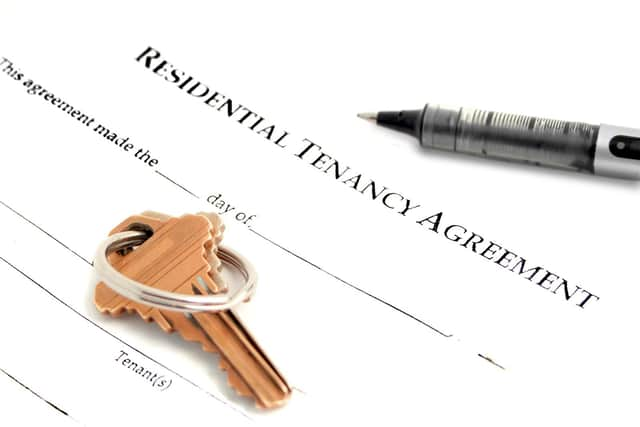Don’t be greedy is the message for landlords tempted to take advantage of lack of supply by raising rents
Some landlords and letting agents are taking advantage of an acute supply and demand issue in the rental sector by putting up rents “because they can”, adding to the huge burden now faced by tenants on low incomes.
Rent increases combined with the cost of living crisis are set to create an unbearable strain for those already struggling to cope financially. Rightmove’s rental index for the first quarter of this year shows that national average asking rents outside of London rose by 10.8 per cent and hit a new record of £1,088 per calendar month, rising from £982 pcm last year.
Advertisement
Hide AdAdvertisement
Hide AdTenants are also faced with the most competitive rental market ever recorded by Rightmove, with more than triple the number of prospective tenants as there are rental properties available.


Property Post reader David Booth, who has two buy-to-let homes in the Leeds rea, wrote to tell us that the letting agency he uses did not even formally ask whether he wanted to up the rent on his properties. Instead they simply emailed stating: “For your reference. The current rent is £725 per month and we will attempt to achieve £760.”
“There was no ‘what do you think?’. It was simply, if you want the tenants to renew, here’s what we are going to ask for. They can claim they are running it by me but they are
not actually asking me what I want to do. ‘For your reference’ is not seeking my permission or input.”
Advertisement
Hide AdAdvertisement
Hide AdOf course, a rise in rent for tenants equals an increase in income for the letting agents as they usually take between 10 and 15 per cent of the rent as their commission for managing a property.
David contacted his agency to tell them not to increase the rent at this difficult time and says: “I think it is important that landlords are sensitive to market conditions.”
Patricia Tyler, who has two terraced rental properties near Skipton, says that her letting agency informed her that she could up the rent to £600 per month for a two bedroom
terraced house she lets rather than the £495 the tenant was paying.
Advertisement
Hide AdAdvertisement
Hide Ad“They are a good agent and were doing their job by telling me what I could get given the shortage of properties to let in the area but I am conscious that the single mum who lives in my house would struggle with any rent increase at all when her tenancy comes up for renewal.
“She has been a very good tenant for the last two years and really looks after the house so I won’t be greedy and I’d urge other landlords to think twice about raising rents just because they can and causing extra, unnecessary hardship at what is going to be a very difficult time.
“All landlords will have enjoyed excellent capital growth on their properties over the last couple of years as house prices have risen and they should be very happy with that. There’s is no need to chase a few extra quid in rent that will mean nothing to them after tax.” Patricia adds that charging a fair but not excessive rent and keeping up with repairs has helped her retain good tenants.
Sam Saunders, who rents Patricia’s house, says: “It’s a struggle to make sure all my bills are paid and I am dreading winter. Paying more rent would’ve added to my worries so I am really grateful that Patricia isn’t putting up the rent even though she could.”
Advertisement
Hide AdAdvertisement
Hide AdJames Wood, policy manager for the National Residential Landlords Association, said: “Whilst letting agents will often advise landlords about the rents being charged, we would be concerned where they are increasing them without the prior approval of the landlord whose property it is. In setting rents, we recommend that landlords consider their costs and the rates the local market will tolerate. For many, the best option will be to freeze rents in order to sustain tenancies. Void periods and reletting costs for empty properties can quickly erase any increase in rents.
“Where a rent increase might be needed, we would advise landlords to discuss the rent level with their tenants and to be prepared to compromise if they are financially able.
“For instance, a household may be able to accommodate a lower rent increase and remain in situ and able to service their agreement, whilst a larger increase could lead to arrears and, in the most extreme cases, the failure of a tenancy.”
Luke Gidney, managing director at Yorkshire-based HOP lettings agency, says: “We increase rents, where appropriate, on new lets when tenants leave their property, which landlords are happy with.
Advertisement
Hide AdAdvertisement
Hide Ad“However, where a tenant remains in a property, we ask the landlord first whether they would like to increase the rent for a further period of occupancy. Some landlords are refusing an increase due to the cost of living crisis, and some landlords prefer to keep rents lower for tenants they know are looking after the property and paying their rent on time.”